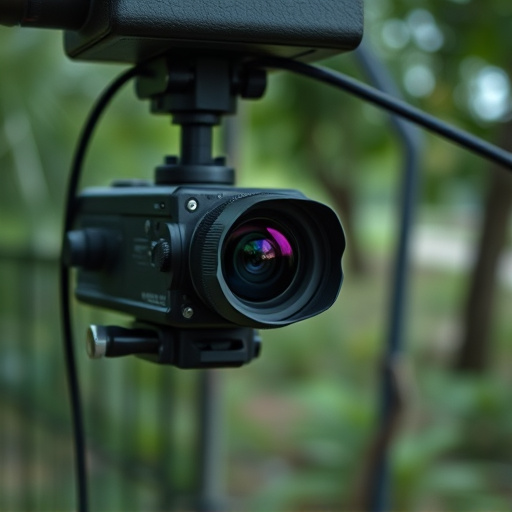RF detectors and specialized tech empower renters to identify hidden cameras, enhancing privacy. Renting discreet security cameras offers flexible solutions while respecting local laws and privacy rights. Proactive measures, regular checks, and non-intrusive options ensure safer spaces for tenants.
Uncover the secrets behind hidden surveillance with our comprehensive guide. Learn how RF detectors can sweep for covert cameras, ensuring your privacy. We explore the world of discrete security cameras tailored for tenants, offering a renter’s survival kit. Discover tools and techniques to identify hidden devices, understand legal protections, and implement strategies to thwart unwanted surveillance. Equip yourself with knowledge to navigate this modern-day enigma.
- Understanding RF Detectors: Uncovering Hidden Cameras
- Renting Discrete Security Cameras: A Guide for Tenants
- Identifying Hidden Cameras: Tools and Techniques
- Legal Considerations: Protecting Your Privacy
- Effective Strategies: Detecting and Preventing Surveillance
Understanding RF Detectors: Uncovering Hidden Cameras
RF (Radio Frequency) detectors are powerful tools in the world of discrete security, especially when it comes to uncovering hidden cameras, often referred to as “nannycams” or covert surveillance devices. These detectors operate by scanning for RF signals, which many modern security cameras emit to transmit video and audio data wirelessly. For renters concerned about their privacy, understanding how to use these devices can be a game-changer.
With the rise of discrete security cameras for renters, it’s essential to know that such devices can often be detected using RF technology. By renting or purchasing an RF detector, individuals can actively search for and identify hidden cameras in their homes or offices, ensuring peace of mind and maintaining control over personal spaces. This simple yet effective method empowers people to protect their privacy and security without needing extensive technical knowledge.
Renting Discrete Security Cameras: A Guide for Tenants
Tenants often look for discreet security solutions to protect their homes or rented spaces, and one effective option is renting discrete security cameras. This alternative provides peace of mind without the need for extensive installation processes or long-term commitments. Many companies specialize in providing these camera systems on a rental basis, making them accessible and cost-effective for individuals seeking temporary or supplemental surveillance.
When considering discrete security cameras for renters, it’s essential to research reputable rental services that offer high-quality equipment with reliable support. Look for cameras designed with portability and minimal impact on the environment in mind, ensuring they blend seamlessly into their surroundings without drawing unwanted attention. Additionally, understanding the rental terms, including duration, pricing, and any maintenance or replacement policies, will help tenants make informed decisions to meet their specific security needs.
Identifying Hidden Cameras: Tools and Techniques
Identifying hidden cameras has become a crucial skill, especially for renters who value their privacy and want to ensure they’re not being spied on. While it’s essential to remember that discrete security cameras are legally used by landlords for property management, recognizing potential hidden camera setups can empower renters to take proactive measures.
One of the primary tools in this quest is a radio frequency (RF) detector. RF technology detects signals and can pinpoint devices operating on specific frequencies, including many hidden cameras. Renters can use these detectors during sweeps to identify unusual electromagnetic emissions that might indicate secretly installed cameras. Additionally, utilizing infrared (IR) technology or thermal imaging cameras can reveal heat signatures different from the surrounding environment, potentially exposing hidden lenses or components. These techniques, combined with a keen eye for detail, can help individuals uncover discreetly placed surveillance devices in their homes.
Legal Considerations: Protecting Your Privacy
When using a RF detector sweep hidden camera, it’s crucial to understand and respect legal considerations regarding privacy. Since many countries have stringent regulations around surveillance, especially in residential areas, renting discrete security cameras comes with certain obligations. For renters, it’s important to check local laws before installing any form of monitoring system to ensure they are not infringing on their neighbors’ privacy.
Using hidden cameras for security purposes is generally acceptable if done responsibly and ethically. However, capturing images or videos without the consent of individuals present in private spaces can lead to serious legal repercussions. Therefore, when considering discrete security cameras for renters, it’s essential to opt for non-intrusive options and use them solely for legitimate security reasons, always respecting the privacy rights of everyone involved.
Effective Strategies: Detecting and Preventing Surveillance
Detecting hidden cameras has become an essential aspect of maintaining privacy, especially for renters who may be concerned about their security. One effective strategy is to employ RF (Radio Frequency) detector sweeps using specialized equipment. These devices are capable of picking up signals from a variety of surveillance devices, including those that operate discreetly. By renting or purchasing an RF detector, individuals can proactively search for hidden cameras in their living spaces, ensuring no unwanted eyes are watching.
Additionally, prevention is key. Regularly checking utility boxes and vents for any suspicious devices, and being vigilant about unfamiliar objects in common areas, can significantly reduce the risk of becoming a victim. For renters considering discreet security cameras, opting for rental options allows them to protect themselves without making long-term commitments. This approach enables individuals to maintain control over their personal spaces while staying one step ahead of potential surveillance threats.
In conclusion, understanding RF detectors and familiarizing yourself with tools like discrete security cameras for renters can significantly enhance your privacy. By staying informed about legal considerations and employing effective strategies, you can actively detect and prevent surveillance, ensuring a safer and more secure living environment.
